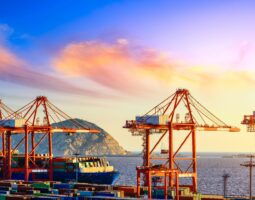Section 232 Tariffs imposed on Aluminum and Steel Derivatives
Section 232 Tariffs imposed on Aluminum and Steel Derivatives
President Trump issued a proclamation on Friday, January 24, 2020 in regards to steel and aluminum imports pursuant to section 232 of the Trade Expansion Act of 1962, as amended (19 U.S.C. 1862). After further investigation, new reports were submitted by the Secretary of Commerce on aluminum and steel articles, specifically the continuance of such imports, and their threat to the United States’ national security and U.S. domestic industries.
Aluminum & Steel Derivative Imports Threaten U.S. Economy
In the White House proclamation, President Trump states, “The Secretary has informed me that domestic steel producers’ capacity utilization has not stabilized for an extended period of time at or above the 80 percent capacity utilization level identified in his report as necessary to remove the threatened impairment of the national security. Stabilizing at that level is important to provide the industry with a reasonable expectation that market conditions will prevail long enough to justify the investment necessary to ramp up production to a sustainable and profitable level. Capacity utilization in the aluminum industry has improved, but it is still below the target capacity utilization that the Secretary recommended in his report. Although imports of aluminum articles and steel articles have declined since the imposition of the tariffs and quotas, the Secretary has informed me that imports of certain derivatives of aluminum articles and imports of certain derivatives of steel articles have significantly increased since the imposition of the tariffs and quotas. The net effect of the increase of imports of these derivatives has been to erode the customer base for U.S. producers of aluminum and steel and undermine the purpose of the proclamations adjusting imports of aluminum and steel articles to remove the threatened impairment of the national security.”
Ad Valorem Tariffs on Aluminum & Steel Derivatives
As a result, effective February 8, 2020
- an additional duty of 10% will be imposed on derivative aluminum articles
- The aluminum derivative tariffs will apply to all countries except Argentina, Australia, Canada, and Mexico.
- an additional duty of 25% will be imposed on derivative steel articles
- The steel derivative tariffs will apply to all countries except Argentina, Australia, Brazil, Canada, Mexico and South Korea.
What Qualifies as an Aluminum or Steel “Derivative”
An article is “derivative” of an aluminum article or steel article if all of the following conditions are met:
- the aluminium or steel article represents, on average, two-thirds or more of the total cost of materials of the derivative article
- import volumes of such derivative article increased year-to-year since June 1, 2018 in comparison to import volumes of such derivative article during the 2 preceding years
- import volumes of such derivative article following the imposition of the tariffs exceeded the 4% average increase in the total volume of goods imported into the United States during the same period since June 1, 2018.
Examples of such derivatives include:
The derivatives currently have a very narrow scope. Such examples include specific steel nails, tacks, drawing pins, corrugated nails, staples, aluminum stranded wire, cables, plaited bands, bumper and body stampings of aluminum and steel for motor vehicles and tractors. The Secretary of Commerce specifies the exact “derivative articles” of aluminum in Annex I and of steel in Annex II of the White House proclamation and in subchapter III of chapter 99 in the HTSUS.
The Secretary of Commerce and USTR will continue to monitor imports of these articles, and implement quotas or voluntary agreements from certain countries if need be. Relief may be given if product exclusions are requested and approved. Duty drawback is not allowed on these Section 232 derivatives.
Background
On January 11, 2018, the Secretary of Commerce submitted reports after investigations on the effects of imports of aluminum and steel articles on the national security of the United States. Both reports showed findings that aluminum and steel were being imported into the United States in such quantities and under such circumstances as to threaten to impair national security of the United States. Pursuant to section 232 of the Trade Expansion Act of 1962, as amended (19 U.S.C. 1862), effective March 23, 2018, President Trump imposed additional duty rates of 10% on aluminum imports and 25% on steel imports from almost all countries. Since then, steel import exemptions have been granted to Canada, Mexico, South Korea, Australia, Brazil and Argentina. All exemptions have an absolute quota cap except for steel imports from Australia. Moreover, aluminum import exemptions have been granted to Canada, Mexico, Argentina and Australia. These exemptions also have an absolute quota cap except for aluminum imports from Argentina.
Exclusions
An organization can petition for an exclusion. As stated by the Federal Register, any organization looking to submit exclusion requests, objections to exclusion requests, rebuttals and surrebuttals must use the new “232 Exclusion Portal,” which went live in June 2019. The DOC has created resources and guides to help importers navigate their way through the process making it easier to file an exclusion. The portal reflects a significant improvement. You can download the instructional guide here or visit Section 232 Steel and Aluminum Exclusion Portal.
Consulting
If you are still looking for help, Scarbrough Consulting can help make your job easier. Scarbrough is offering a FREE 30-minute consultation to any importer affected by the Section 232 Tariffs. Email consulting@scarbrough-intl.com or fill out the form below.
Oops! We could not locate your form.
Other ways to Learn More about Duty Savings
If the Section 232 tariffs are affecting your company, watch this webinar recording to learn more. Scarbrough’s President and COO, Adam Hill, along with Patrick Caulfield, an attorney at GDLSK, an international trade and customs law firm, talk about legal opportunities to recover or avoid paying duty to CBP. This is an interactive webinar set up as a question/answer forum.


